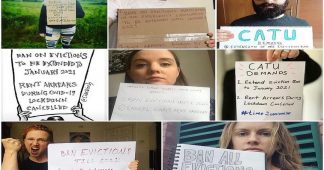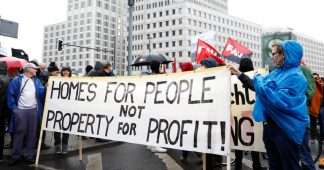In the best of economic times, large numbers of homeless Blacks, Indigenous peoples, and other disenfranchised, impoverished and marginalized members of our society live in squalor on our streets while much larger numbers of housing units sit empty. This is disgraceful, unacceptable and unjust, and it contributes to major discrepancies in wealth and power in the US population. No one should be homeless, and existing properties must not be allowed to remain empty merely to restrict market supply and artificially inflate prices for private gain. When all persons have reliable, adequate housing, they will be empowered to confront racism, police brutality and other injustices in society, and will become a broad, popular base for reform.
A first step in rectifying this inequity is to institute a tax on vacant property, making it unattractive to keep it without residents for a significant time. This incentive will lower the rate on rental property and make it more available to a wider population. Existing anti-blight and landlord statutes and regulations may be sufficient to maintain the quality of the housing, but will need to be strictly enforced with fines and penalties that are serious deterrents to substandard conditions.
A second step is to provide more affordable housing. Many local governments require developers to include affordable housing in their contracts and fine them if they fail to provide it. Unfortunately, the fines are often considered merely a cost of doing business, and the funds often get used for expenditures that do little to provide low cost housing. The requirement must be to actually construct the housing units, and not to concentrate them in a section of the municipality that segregates low income people from the rest of society. In lieu payments must not be accepted as a way for developers to satisfy this requirement.
A third housing option is a community land trust (CLT) controlled by the community and offering units that can be either leased to low income residents and families, or sold to them while the community retains possession of the land. This option makes it easier for persons with low incomes to become buyers and develop equity that can be used to graduate to home ownership that includes the land. It also offers the possibility of motivating developers to satisfy the requirement for affordable housing by purchasing suitable land and buildings to place in the trust and/or constructing units on the land, as approved by and with the agreement of the trust and the local housing authorities.
One of the advantages of a CLT is that it keeps housing development more closely in the hands of the community and stabilizes land prices, discouraging speculation. Developers often oppose CLTs for that very reason, and it’s why we must insist on measures of this kind if we are to succeed in empowering the disenfranchised and marginalized members of our society and transferring power from the elite.
Finally, local governments must be made responsible for assuring adequate housing for all its residents, with the participation of larger supporting governmental units in order to to avoid placing localities with larger disadvantaged populations under undue burden. Penalties should be established for failure to provide adequate housing for all the population within a municipal boundary. This is a practice common in Germany and other countries, and it places the burden and the shame on communities that fail to meet their obligation. Many third world countries are able to enforce such requirements, as well. It is time for the U.S. to do the same and take care of all of its people.
Succeeding installments of this Manifesto will address the following issues that will contribute to spreading power and wealth to all members of society and especially Blacks, Indigenous peoples, and other groups that are currently disenfranchised and marginalized:
- Providing a clean, healthy living environment for us all, but especially for the most vulnerable among us,
- Improving the quality and accessibility of our educational system, including high quality free higher education to all,
- Empowerment of the people in government, freer and more accessible voting rights, an end to the Electoral College, elimination of power elites and protection of rights to all, including full sovereignty for indigenous nations and renegotiation of reparations,
- Greater restrictions on the rights of corporations and financial institutions, and more democratic financial institutions, as well as a cabinet level Department of Consumer Protection and Advocacy, mortgage reform, an end to derivatives, and other reforms of investment and financial institutions and practices,
- Support for and extension of labor unions to currently unorganized workers, and greater participation in international unionization, including prohibition of, or disincentives for, importation of nonunionized goods and use of nonunionized services
- Greater access for noncitizens to legally enter the US for work purposes, protection and documentation of undocumented persons within the US, and greater liberalization of access to U.S. citizenship,
- An end to concentration of the media into the hands of a small elite, greater access to wider media messages, an end to monopolistic practices and censorship, especially politically directed censorship and influence by social media,
- A complete change in policing, with greater restraints upon the use of force, community control of police hiring, firing and discipline, and a rethinking in how police are recruited and trained, as well as a shift in police culture and how to accomplish it,
- A reduction in incarceration and an end to the prison industrial complex,
- Closure of all U.S. military installations outside U.S. territory, an end to intervention and interference in the affairs of other countries, and an end to economic sanctions against other nations. Closure of clandestine operations in the CIA, or transference of such capabilities to the Pentagon. Abolishment of the AUMF,
- Respect for the sovereignty of, and an end to attempts to dominate other nations.











